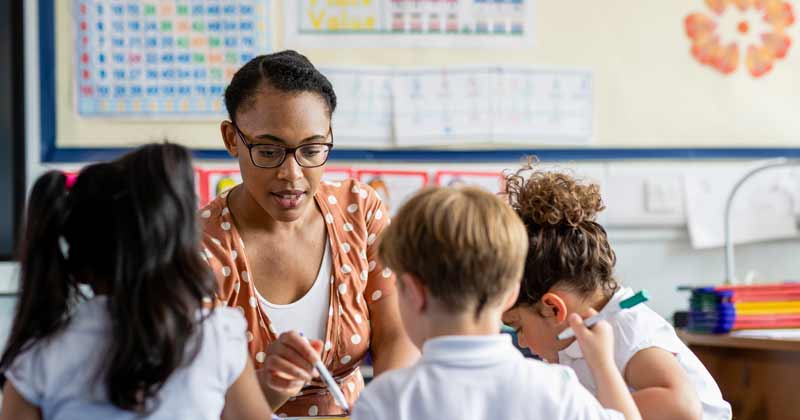I’m 50 years old and I’ve just been back to school. I met some amazing teachers and some absolutely incredible kids, but I came away feeling a bit deflated. When it comes to SEND, nowhere near enough has changed since I was a child.
Teachers and educators are working their socks off to inspire our future generations, but they’re being tripped up, because they’re being sent into the classroom without the skills and knowledge they desperately need to enable and empower every child. Dyslexia is one of the biggest areas of need in the classroom.
Writing for Schools Week, I know I’m preaching to the converted. I’ve heard repeatedly how frustrating it is to be working within a system that’s laser-focused on just 75 per cent of the class, allowing SEND children to fall between the cracks.
You wouldn’t open a supermarket that only caters to 75 per cent of the population, and you’d never get away with it in a restaurant.
Neurodivergent children aren’t broken. They’re creative, curious and capable, but they are being let down simply because they experience the world (and the classroom) differently.
Ignore those differences and the consequences can be profound. It’s not just about struggling with reading and writing, and therefore a much increased chance of disengaging with education more broadly. For me, it’s really about mental health, self-worth and reduced life chances.
I’ve been pretty vocal about the fact that I found school a real challenge. But it’s 2025! Surely it’s time to move things along.
I was constantly dragged out of class to go down the corridor to my ‘special needs’ class, and my peers constantly took the mickey out of me. But I was OK because out of school – growing up in a pub – I had cooking.
It’s 2025! Surely it’s time to move things along
I was lucky. Cooking gave me drive, confidence and hope. What school eroded away, I found in the kitchen.
But what about all the kids who haven’t found their thing yet? Most won’t within their school years. School is supposed to be a safe space, an inspiring place where all kids can grow and thrive at their own pace.
We need to acknowledge that dyslexia and other neurodivergences are simply different ways of thinking, learning and interpreting. Britain and its kids deserve a truly inclusive school system that values all ways of learning, flexing to the needs of all children.
That it doesn’t is not a failure of our teachers; it’s a failure of the system, which fundamentally needs to be reimagined and appropriately supported. But there are a couple of key actions that could kickstart all of this and make a real difference right now.
First, we need to move from a reactive system to a proactive one, by ensuring all children have a universal dyslexia and neurodivergence screening check within their early years at school.
Right now, 80 per cent of those with dyslexia leave school undiagnosed. Learning differences don’t follow a neat, linear path, so we need multiple opportunities within school years to identify when a child is struggling.
A simple, in-class screening tool could be profound, and there are many ready and waiting to be built into the national curriculum assessment schedule.
We also need better support for our teachers, educators and support staff. Current teacher training doesn’t equip them to help every child to reach their full potential.
Dyslexia-friendly teaching must be at the heart of initial teacher education, early career development, and ongoing professional development.
The 2024 update to the initial teacher training framework developed by the previous Conservative government was an improvement, but it’s not enough. There’s no mention of dyslexia or specific learning difficulties, it’s still too focused on phonics and doesn’t offer a broader toolkit.
It also does nothing to develop the knowledge and understanding of those already teaching, who need additional support to nurture the neurodivergent kids in their classes.
We’re at a turning point. The education system is under pressure, but it’s also hungry for change. We need to act now.
Let’s please support the next generation of teachers so they can support the next generation of learners, whatever their needs.
Jamie’s Dyslexia Revolution airs tonight at 9pm on Channel 4












Your thoughts